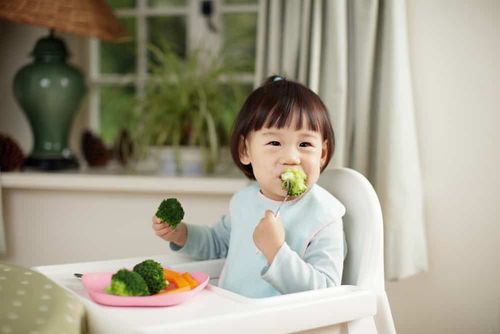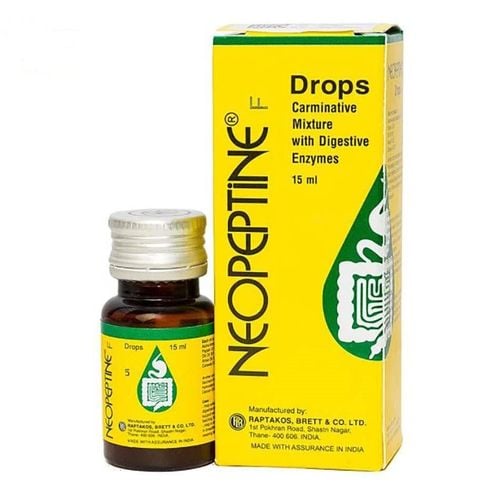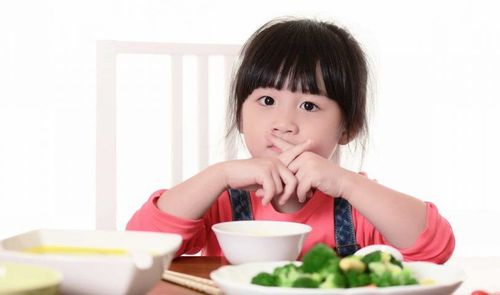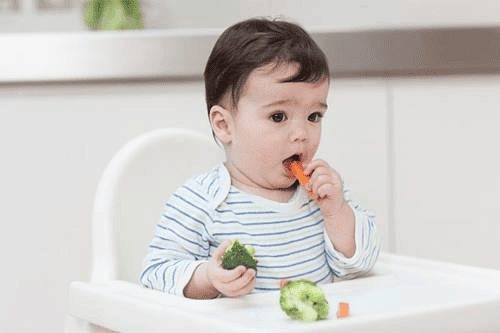This is an automatically translated article.
In addition to breast milk, weaning meals are very important for baby's physical and intellectual development. When the baby is growing up, many parents wonder when is the right time to give the baby porridge, how many months to give the baby porridge and when to give the baby porridge. The following article will answer those questions, help children have appropriate and nutritious meals.
1. When should baby eat porridge?
Depending on the age of the baby, parents need to change the meals accordingly. When the baby reaches the age of 6 months, the baby begins to learn to eat solid foods from thin to thick, from little to a lot. The time for baby to eat powder lasts from 6 months to 8 months old. Parents should practice giving their baby a powdered meal, starting with a sweet powder with vegetables and fruits, then a saltier meal by adding meat, fish, and shrimp.
When the baby is growing up, many parents wonder when is the right time to give the baby porridge, how many months to give the baby porridge and when to give the baby porridge. The answer is that the baby should start to transition to porridge from 8 months of age, that is, at the end of the powdered feeding period. At 8 months of age, some babies begin to grow their first baby teeth, they can learn to chew rough foods as small as peas. So at this time, giving the baby porridge needs to be pureed because his chewing skills are not good, he may vomit because the porridge is difficult to swallow. Moreover, at this stage, the baby's stomach is weak, the small intestine wall of the baby is still thin, so it cannot digest raw food. The benefit of starting to eat porridge is that it is easy for your baby to eat, swallow, digest and absorb nutrients. Therefore, feeding porridge pureed from 8 to 9 months old is reasonable.
Porridge puree is just the beginning step to practice feeding your baby porridge. Therefore, parents should only feed the baby pureed porridge for 1-2 months so that the baby can get used to the messy food. In the 10th month, when the baby has eaten quite well, parents should start feeding the baby with broken porridge along with pureed foods of a certain roughness. Porridge should not only be cooked with bone broth, because that will not provide enough nutrients, but the baby needs to eat meat, fish and vegetables. Parents should stew a separate pot of porridge. At each baby's meal, porridge is scooped out and cooked each meal with meat, fish, vegetables, and added with cooking oil for enough nutrients.
When the baby reaches the cradle age, that is, the baby is 1 year old, parents should start feeding the baby with whole grain porridge to secrete gastric juice to digest food and stimulate the baby's appetite. Some parents still have the habit of pureeing porridge even though the baby is more than 1 year old, although this will help the baby eat faster and easier, but it will cause the stomach to secrete insufficient gastric juice, the baby has no appetite. Only swallowing, so poor chewing skills, gradually lead to anorexia, picky eaters.
Watch now: What is a delicious, nutritious porridge to cook?

Giải đáp khi nào cho bé ăn cháo thì thích hợp?
2. Notes when training babies to eat porridge
In order for the baby to gradually adapt to eating porridge and make eating easier for the baby, parents should let the baby get used to new foods gradually. That is, starting with sweet flavored powder first and then gradually replacing it with a little saltier powder with more nutritional ingredients, followed by ground porridge and then practicing to feed your baby porridge from broken grains to porridge. whole grain. Gradually increasing the coarseness of the food helps the baby not to react when eating strange foods and the baby's digestive system can keep pace with the process of digesting and absorbing more complex foods.
In order for the baby's digestive system to gradually adapt to the increasingly rich food and nutritional ingredients, parents should give the baby a small amount and then gradually increase it, from 1/3 cup of porridge to half a cup and followed by a cup of porridge... Thus, it will ensure that the baby has a good digestive system and absorption of nutrients, providing adequate energy needs as well as nutrients needed for growth and development. children physically and mentally.
Each baby's porridge meal must ensure enough 4 important food groups to help the baby develop well. The group of powdered sugars includes rice, corn, potatoes... The protein group includes meat, fish, shrimp, eggs, milk, soy products and other legumes... The fat group includes oils and fats. , cheese, butter, and oilseeds such as olive oil. A group of vitamins and minerals found in vegetables and fruits. Accordingly, it should be noted that babies under 8 months old should not eat meat such as chicken, beef, seafood, ... because babies at this stage do not have enough digestive enzymes to digest foods. eat this, and some children are susceptible to seafood allergies at a young age. Instead, children should eat healthy foods such as lean pork, fish, ... In addition, for young children, nutrition experts recommend not to add fish sauce or salt. into your baby's food, because his kidneys are still weak. When adding fish sauce or salt to the dish, it will cause the baby's kidneys to work too hard, causing a lot of health problems later.
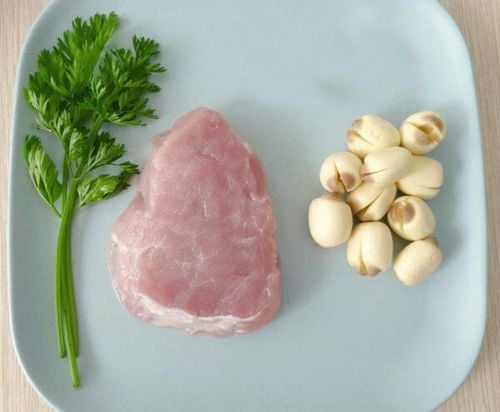
Nên cho bé ăn những loại thực phẩm lành tính như thịt nạc heo
For fresh meats such as pork and beef, puree, marinate a little baby oil and then put in the refrigerator for use during the day. Meat should not be cooked too thoroughly, even stewed until the meat is soft because it will lose nutrients and no longer taste delicious. For shrimp, fish, crab, and eel, fry onions (small white onions, which have the effect of deodorizing fishy odors), stir-fry with spices until just cooked, then puree and store in the refrigerator for a day. . With fresh vegetables should be ground with water or chopped, stored in the refrigerator and used within the day. With tubers should be chopped, boiled, then take both the water and the tubers into the blender, store in the refrigerator and use within the day. For example, with pumpkin, carrots, and cauliflower, they can be cooked and then pureed without puree so that the baby can practice chewing and handling raw food because at this time, the baby's stomach is also getting used to it and can digest it. Okay. With grain porridge, there is no need to puree, but just cooked rice and beat until smooth or smooth. Cook porridge separately, food separately, then grind each type. At meals, porridge and food can be mixed together or divided into small portions for the baby. It is not recommended to mix meat and fish together such as pork with beef, field fish with sea fish, shrimp with crab, etc. Parents should also note that many vegetables should not be combined together because It takes away the unique flavor of each vegetable and can be difficult for your baby to digest. The best ratio for the combination of proteins of animal and plant origin is 50/50, for example, for lunch, the baby eats porridge with meat, fish, eggs, ... then in the afternoon, feed the baby porridge with beans. , vegetables,... Although it is possible to prepare food for a day, it is best for children to eat when their parents cook meat and vegetables for that meal to ensure nutrients as well as food safety and hygiene.
For children to be healthy and develop well, it is necessary to have a nutritious diet in terms of quantity and quality balance. If children are not provided with adequate and balanced nutrients, it will lead to diseases of excess or lack of nutrients, which adversely affect the comprehensive development of children in terms of physical, mental and motor skills.
Children who do not eat properly are at risk of micro-mineral deficiency causing anorexia, growth retardation, malabsorption,... If they notice the above signs, parents should supplement their children with products. The supplement contains lysine, essential micro-minerals and vitamins such as zinc, chromium, selenium, and B vitamins to help fully meet the nutritional needs of children. At the same time, these essential vitamins also support digestion, enhance nutrient absorption, help improve anorexia, and help children eat well.
Parents can learn more:
Signs of zinc deficiency in children
Micronutrient deficiency and failure to gain weight in children
Please regularly visit Vinmec.com website and update useful information to take care of your child. Take care of the baby and the whole family.




